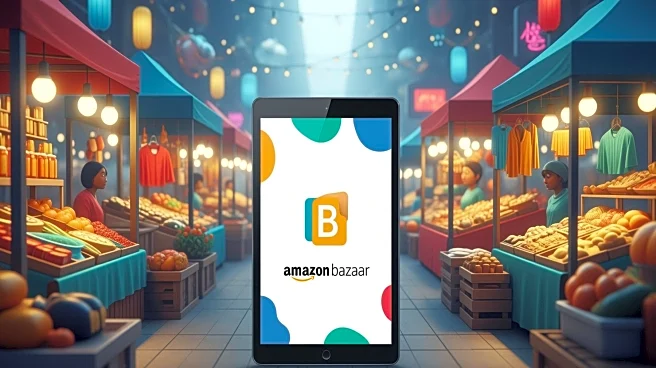What's Happening?
Amazon has introduced a new standalone shopping app called Amazon Bazaar, aimed at providing low-cost products to markets in Asia, Africa, and Latin America. The app, available on Android and iOS, offers
products mostly priced under $10, with some items as low as $2. Initially, Amazon Bazaar is accessible in countries such as Hong Kong, the Philippines, Taiwan, Kuwait, Qatar, Bahrain, Oman, Peru, Ecuador, Argentina, Costa Rica, the Dominican Republic, Jamaica, and Nigeria. Amazon plans to expand the app's availability to more markets in the future. This move is part of Amazon's strategy to compete with low-cost Chinese shopping apps like Temu, Shein, and TikTok Shop, which have gained popularity among younger consumers and those with limited disposable income. The app features Amazon's familiar customer reviews and star ratings, and supports multiple languages including English, Spanish, French, Portuguese, German, and Traditional Chinese.
Why It's Important?
The launch of Amazon Bazaar signifies Amazon's strategic push to capture a larger share of the low-cost retail market, which is currently dominated by Chinese apps. By offering affordable products in emerging markets, Amazon aims to attract consumers who are price-sensitive and looking for budget-friendly options. This expansion could potentially increase Amazon's global footprint and revenue streams, while also providing consumers in these regions with access to a wider range of products. The app's interactive features, such as social lucky draws and promotions, are designed to engage users and enhance the shopping experience, further positioning Amazon as a competitive player in the low-cost retail sector.
What's Next?
Amazon plans to expand the availability of the Bazaar app to additional markets in the coming months, potentially increasing its reach and influence in the low-cost retail space. As the app gains traction, Amazon may introduce more localized features and promotions to better cater to the preferences and cultural nuances of each market. The success of Amazon Bazaar could prompt other major retailers to explore similar strategies, intensifying competition in the global low-cost retail market. Additionally, Amazon's focus on affordable products may lead to partnerships with local suppliers and manufacturers, further diversifying its product offerings.
Beyond the Headlines
Amazon's decision to use different names for its low-cost inventory in various markets highlights the importance of cultural sensitivity and localization in global business strategies. By tailoring its branding to resonate with local language preferences, Amazon aims to build stronger connections with consumers and enhance brand loyalty. This approach underscores the growing trend of multinational companies adapting their operations to better align with regional consumer behaviors and expectations.










